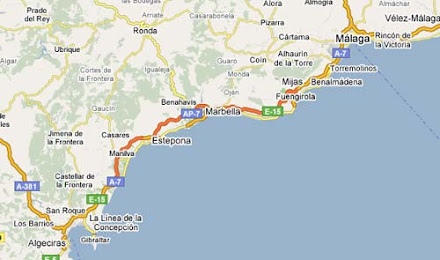Jock Barker, had been on the run from Strathclyde Police since 1999 when he disappeared while on bail for drug offences. British police tracked him down and extradited him back to Scotland so he could be brought to justice.Barker was convicted of dealing cocaine and amphetamines in Scotland. In March 1999, in a massive surveillance operation, undercover police watched as he accepted cocaine in the car park of Wellbeck Golf Club in Troon. He fled the scene and threw bags of cocaine out of the car window during the chase that followed. The previous year he had been spotted supplying amphetamines in Renfrewshire. The drugs involved in the two incidents were worth £141,000.As he passed sentence at the end of the trial this week, Judge John Morrice told Barker, who was one of the UK's ten most wanted criminals, that drug dealing was evil and a scourge on society.Barker, originally from Irvine, Ayrshire, is just the latest criminal to be brought back to Britain as part of a crackdown on the infamous ''Costa del Crime''.The crackdown, labelled Operation Captura, has been orchestrated by the Serious Organised Crime Agency (Soca) alongside UK charity Crimestoppers and Spanish police.The collaboration was launched in 2006, with Soca appealing for information from ex-pat communities and holidaymakers, publishing "Most Wanted" lists on the Crimestoppers website.
Once Soca has identified the whereabouts of the criminal it contacts Interpol, then the Spanish authorities, who make the arrest locally.Crimestoppers' director of operations Dave Cording said: "Operation Captura has been a great success, with 13 criminals arrested from 30 images posted on our website."These individuals are extremely dangerous and have committed serious crime including murder, drug trafficking and fraud worth millions of pounds. With 'Most Wanted', they have nowhere to hide. Their picture is on the net for all to see."Criminals escaping to Spain is nothing new. It first started in the late 1960s largely on the back of London bank robberies.It was dangerous for criminals to have large quantities of stolen cash sitting around so they started investing in property in Europe, particularly Spain.Extradition was rare, partly due to tension between Britain and Spain over Gibraltar in the late 1970s. Large ex-pat communities gave criminals a cloak to hide under, and the movement away from Britain also meant crooks moved out from under the scrutiny of the British authorities. They were unknown to police on the continent, and the lack of co-operation between European law enforcement agenciesmade it difficult to catch and extradite criminals.Professor Graeme Pearson, former head of the Scottish Crime and Drug Enforcement Agency (SCDEA),
said: "Criminals moving to Spain were relatively safe because of the inability of law enforcement to acquire warrants and gather evidence across Europe."The creation of organisations like Europol, Interpol and Eurojust all helped to change that as these organisations have led to joint investigation teams. "Whereas in the past doing a criminal investigation in Spain was extremely difficult, the new organisations have enabled law enforcers to work together and co-operate internationally."Prof Pearson also said that the Barker case shows criminals no longer have safe havens in places like Spain.He said: "Perhaps in the past Barker would have been safe in Spain, but now it is much easier for the authorities to catch criminals based in one place. "Law enforcement still finds it difficult to move as fast as the criminals but the creation of European arrest warrants has made it easier to bring criminals back to Britain."
European arrest warrants came into force in Britain on 1 January 2004 and have been used 43 times between Scotland and Spain since then. Mungo Bovey QC, an expert in extradition law, said: "The introduction of the European arrest warrant now makes the process of extradition much faster than it used to be."This makes it very difficult for criminals associated with the 'Costa del Crime' to hide in Spanish beach towns, and the days of criminals lurking in Spain evading the authorities are now becoming a thing of the past."British fugitives living the high-life on the Costa del Sol has been a source of fascination since those believed to be behind the £6 million Security Express robbery in 1983 moved to Spain. Ronnie Knight, former husband of EastEnders star Barbara Windsor, spent a decade on the run there.
Another notorious criminal who fled to Spain was Kenneth Noye, who laundered proceeds from the 1983 Brinks Mat gold bullion robbery.The area has long been a haven, not just for "retired" criminals, as highlighted in gangster films such as Sexy Beast and The Business, but also used as a base for drug running. In the past, criminals have used the coast to ferry cocaine from Africa and Colombia.
Prof Pearson said: "The British police found it difficult to investigate from a distance, as did Customs and Excise, as they were rarely able to gather evidence.
"Spanish law enforcement was focused on its own national priorities, which did not include the British crime families."At the same time the criminals were building up financial empires capable of being protected by white-collar professionals abroad, as well as corruption. It was only once the drugs arrived on the streets of Britain that officials could see the harm it caused. But linking that back to the organisation behind it, located in Spain, and thereafter generating investigative action, was frustratingly difficult."Detective Chief Superintendent Gavin Robertson, of the SCDEA, said living abroad was no longer any protection for criminals.
He said: "Where drug traffickers or other serious organised criminals from Scotland elect to live abroad, either in the hope of continuing with their criminality or living off the proceeds of their illegally obtained wealth, let me be clear that they are not beyond our reach."We will take all lawful measures to locate them and ensure they face the consequences of their actions. Scotland's communities expect and are entitled to nothing less."
You Might Also Like :














0 comments:
Post a Comment